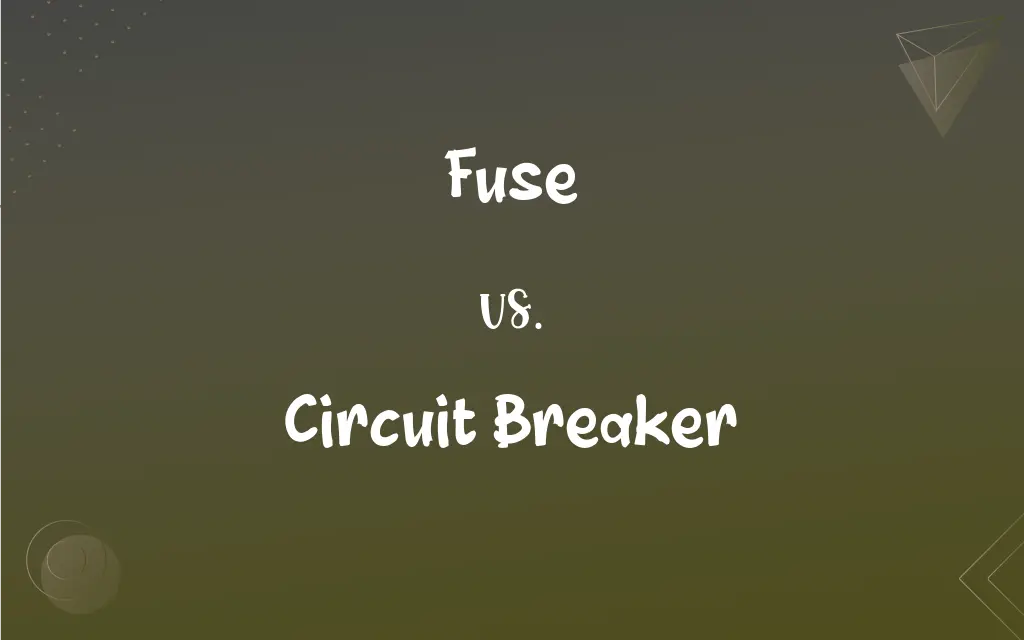Fuse vs. Circuit Breaker: What's the Difference?
Edited by Aimie Carlson || By Harlon Moss || Updated on June 5, 2024
"Fuses melt & break the circuit during overload; circuit breakers trip & can be reset. Both prevent electrical fires."

Key Differences
A fuse is a single-use safety device that protects an electrical circuit from excessive current. It contains a metal wire or strip that melts when too much current flows through it, thereby interrupting the current. On the other hand, a circuit breaker is an automatically operated electrical switch designed to protect an electrical circuit from damage caused by overload or short circuit. Its basic function is to interrupt current flow after a fault is detected.
Fuses are components that must be replaced after they have fulfilled their function. They are typically inexpensive and are particularly useful in situations where there isn't a need for frequent circuit interruption. Conversely, circuit breakers are designed to be resettable and can frequently disrupt the circuit without needing replacement, offering a more practical solution in systems where overloads may occur more frequently.
A fuse operates purely through physical means; the metal element inside physically melts, requiring the entire fuse to be replaced once it has blown. A circuit breaker, however, operates through mechanical methods; it features an internal switch mechanism that is tripped by an unsafe surge of electricity, and it can be manually or automatically reset once the issue is resolved.
The use of fuses is common in applications where simplicity is needed and where space is not a constraint, as the blown fuse needs to be manually replaced for the circuit to be operational again. Circuit breakers are common in residential, commercial, and industrial applications where immediate restoration of service is necessary and safety switches are frequently required.
Fuses and circuit breakers also differ in their response time to an overcurrent situation. Generally, fuses respond quicker than circuit breakers and can protect more sensitive devices. Circuit breakers may take a little longer to interrupt the circuit, but they provide more convenience due to their resettable nature.
ADVERTISEMENT
Comparison Chart
Functionality
One-time use, must be replaced
Reusable, can be reset
Response Time
Generally faster
Comparatively slower
Convenience
Less, due to replacement need
More, due to reset ability
Sensitivity
Can be more sensitive
Standard sensitivity
Usage Frequency
Suited for infrequent interruptions
Suited for frequent interruptions
ADVERTISEMENT
Fuse and Circuit Breaker Definitions
Fuse
As a verb, to fuse means to join or blend to form a single entity.
The metals were heated to a high temperature to fuse them together.
Circuit Breaker
A circuit breaker can also refer to a person or thing that interrupts or prevents a process or continuation.
The unexpected audit served as a circuit breaker, stopping all transactions.
Fuse
A fuse is a safety device consisting of a strip of wire that melts and breaks an electric circuit if the current exceeds a safe level.
During the power surge, the fuse blew to prevent damage to the television.
Circuit Breaker
In technology, a circuit breaker can be a design pattern used in software development to detect failures and encapsulate the logic of preventing a failure from constantly reoccurring.
They implemented a circuit breaker in the software to prevent cascading failures.
Fuse
A fuse can also mean to provide a circuit with a fuse.
Make sure to fuse the circuit properly to avoid electrical overload.
Circuit Breaker
In social contexts, a circuit breaker is a temporary period of imposed restrictions to stop the spread of an event or disease.
The government imposed a two-week circuit breaker lockdown to control the virus spread.
Fuse
In a more abstract sense, to fuse can mean to combine different qualities, ideas, or things into a single composition.
The artist managed to fuse realism and surrealism in his paintings.
Circuit Breaker
A circuit breaker is an automatic device for stopping the flow of current in an electric circuit as a safety measure.
The circuit breaker tripped when the kitchen appliances overloaded the electrical system.
Fuse
In military terminology, a fuse is a device that ignites the explosive material under specific conditions.
The bomb squad carefully deactivated the fuse to prevent an explosion.
Circuit Breaker
In financial markets, a circuit breaker refers to measures taken to temporarily halt trading to counteract sharp declines.
The stock exchange implemented a circuit breaker to stabilize market conditions.
Fuse
A cord of readily combustible material that is lighted at one end to carry a flame along its length to detonate an explosive at the other end.
Fuse
Often fuze A mechanical or electrical mechanism used to detonate an explosive charge or device such as a bomb or grenade
"A mechanical ... switch is used to initiate the fuzes" (International Defense Review).
FAQs
What is a circuit breaker?
A circuit breaker is a switch that interrupts the flow of electricity in a circuit when unsafe levels are detected.
Why do fuses blow?
Fuses blow when they encounter more current than they're designed to handle, indicating an overload or short circuit.
What is a fuse?
A fuse is a device that protects electrical circuits by breaking the connection when current exceeds a specific level.
In which applications are fuses commonly used?
Fuses are often used in electronic devices, cars, and appliances.
Do circuit breakers provide overcurrent protection?
Yes, like fuses, circuit breakers provide essential overcurrent protection.
Are fuses more sensitive than circuit breakers?
Generally, yes. Fuses often respond quicker to overcurrent situations than circuit breakers.
Where are circuit breakers commonly found?
Circuit breakers are standard in residential, commercial, and industrial electrical systems.
Why do circuit breakers trip?
Circuit breakers trip to protect the circuit from damage due to excess current or short circuits.
Can circuit breakers detect ground faults?
Yes, Ground Fault Circuit Interrupters (GFCI) are circuit breakers that can detect ground faults.
Can a fuse be reused after it blows?
No, once a fuse blows, it needs to be replaced.
Can a circuit breaker be reset after tripping?
Yes, circuit breakers can be manually or automatically reset after tripping.
What happens if a fuse is bypassed?
Bypassing a fuse can cause circuit damage, electrical fires, or electrocution due to lack of overcurrent protection.
What causes a fuse to blow for no apparent reason?
Fuses may blow due to surges, worn components, or issues elsewhere in the circuit, even if the reason isn’t immediately apparent.
Can a fuse detect ground faults?
No, fuses can’t detect ground faults; they respond to overcurrent.
What happens if a circuit breaker fails to trip?
If a circuit breaker fails to trip, it can lead to circuit damage, electrical fires, or electrocution.
How are fuses rated?
Fuses are rated by their maximum voltage capacity and current they can handle before blowing.
How are circuit breakers rated?
Circuit breakers are rated based on the maximum voltage they can handle and their interrupting capacity.
Can a fuse be used in place of a circuit breaker?
No, fuses and circuit breakers aren't directly interchangeable due to different operational mechanisms.
Can you upgrade a circuit breaker to a higher amp rating?
Upgrading to a higher amp rating must consider wire size, load capacity, and regulations, and often requires a professional.
Is it safe to replace a circuit breaker on your own?
Replacing a circuit breaker can be dangerous and should usually be done by a qualified electrician.
About Author
Written by
Harlon MossHarlon is a seasoned quality moderator and accomplished content writer for Difference Wiki. An alumnus of the prestigious University of California, he earned his degree in Computer Science. Leveraging his academic background, Harlon brings a meticulous and informed perspective to his work, ensuring content accuracy and excellence.
Edited by
Aimie CarlsonAimie Carlson, holding a master's degree in English literature, is a fervent English language enthusiast. She lends her writing talents to Difference Wiki, a prominent website that specializes in comparisons, offering readers insightful analyses that both captivate and inform.































































